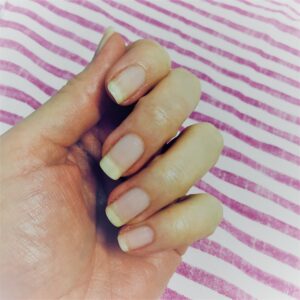Attending an incredible day of chronic skin disease training, to get things started we were asked if we’d received a hug that day. Now I’ve never been the touchy-feely type but what struck me was that not only had I not received a hug that day but in so many days (maybe weeks) that I couldn’t remember my last.
I’m single and I live alone and although I wouldn’t trade it in anytime soon, this can mean the only ‘touch’ I receive is either accidental or from the occasional adjustment of a yoga teacher. And while it’s not something I give much thought to the premise of the training exercise went skin deep.
“I live alone too and I don’t get that daily hug,” says dermatology nurse specialist, Sharon Temby, “but patients with psoriasis have stuck with me over the years and I learned that touch was a big thing for them. I use this exercise early in the day so participants don’t have time to make a judgement, they’re just thrown into it!”
You see, the skin’s primary function is as a barrier and while this is great for our insides sometimes it’s not so great for the ‘being’ living inside. This barrier with the outside world has the potential to set up a physical barrier with other skins around us – whether the human who wears it chooses or not.
In particular, for those who suffer from visible chronic skin diseases where external symptoms can form a ‘barrier to entry’ as people stare and shift away.
“Generally speaking, unless there are open wounds, we’re happy to touch others but with severe cases of psoriasis, eczema, and acne, people look at them,” Sharon explains.
“We look at what’s imperfect, what’s unknown to us, we step away, step back from what we don’t understand; and sufferers of chronic skin diseases know they get judged”.
Which brings us to another important function of skin, touch. Skin and touch are quite literally made for each other, you can’t have one without the other and it’s the reason there are so many nerve endings on the skin.
Touch is a necessary part of the human condition but a chronic skin disease can be both debilitating and isolating, and it can result in you wanting to reject many social experiences. So perhaps you don’t go to that office party, don’t want to let others see you get changed at a gym, or shy away from dating: and it’s no wonder, says Sharon, that many who suffer a chronic skin issue also suffer depression.
“Anxiety, stress…add on any chronic skin disease and you’ve got yourself in a bit of a mess. A lot more work needs to be done as it affects everybody, and we need to draw it to attention,” Sharon adds.
“You can’t know what you don’t know. There’s not a lot of literature on it. People have to know about this and like we say in dermatology, we don’t save lives, we change them.”
I got my hug that day, from a lovely dermal nurse whom I’d only just met. And you know what, I didn’t give a second thought about her skin, or mine for that matter.
Dermatology nurse specialist Sharon Temby not only has a book in the pipeline but is soon to undertake university study in Pharmacy, she is based in Melbourne. #skinfitsister


